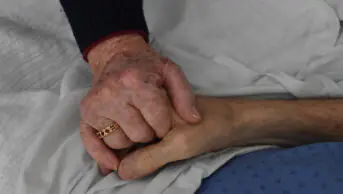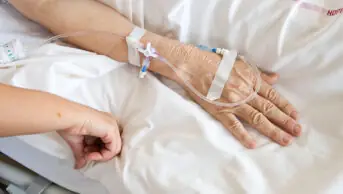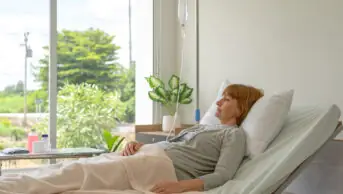
Shutterstock.com/The Pharmaceutical Journal
The majority of people in the UK want to die at home. Results from a survey commissioned by Marie Curie in 2023 show that 56% of all 10,500 respondents and 42% of people with a terminal illness in their last years of life chose home as their preferred place of death. Being free from pain and other symptoms is a top priority for people in their final year of life.
Bearing this in mind, it is vital that an integral goal of good palliative care is to ensure that patients get the maximum benefit and minimum harm from symptom control medicine. Results from the ‘Getting palliative medications right: an activity theory analysis to improve patient safety and carer confidence’ study have demonstrated the benefits of a ‘whole system’ method to understand the experiences of everyone involved in managing palliative medicines.
An evidence-based toolkit of resources for improving palliative medicines management was created from the study findings. Then, supported by the Marie Curie Research Impact Fund, the study researchers led a team of healthcare professionals and people with lived experience across multiple sites to accelerate change.
At Marie Curie in Bradford, West Yorkshire, we were keen to support this quality improvement for impact project, acknowledging the importance of collaboration between academics, the public and practitioners, including our Responsive Emergency Assessment and Community Team (REACT).
What we did
REACT is a partnership between Marie Curie and Bradford Teaching Hospitals NHS Foundation Trust, with social investment from Social Finance UK, Macmillan Cancer Support and Better Society Capital, as well as grant funding from The National Lottery Community Fund. It was set up as a service in June 2022 to provide acute palliative care for patients, their families and carers in crisis, and reduce unplanned and avoidable hospital admissions. REACT is aimed at enabling patients to receive high-quality end-of-life care in their usual place of residence.
REACT depends upon timely access to medicines in the community, which was often problematic
In the first phase of the service, REACT focused on establishing a palliative care in-reach model into the emergency department at Bradford Teaching Hospitals NHS Foundation Trust. This aimed to proactively identify patients who were thought to be approaching the last year of life and support their discharge to a dedicated, rapid response, multidisciplinary virtual ward for 72 hours before being handed over to existing services.
In the second phase, REACT expanded to receive referrals directly from community services (primary and palliative care), enabling a ‘step up’ of care in the community, which avoids unhelpful, costly and often distressing conveyances to hospital.
What we learned
REACT depends upon timely access to medicines in the community, which was often problematic. Often, requests for medicines were made in the evenings or on weekends, but pharmacies were not always open or able to supply medicines. This then led to families and carers making additional and/or longer trips to pharmacies rather than being at home to support their family member or the patient having sub-optimal medicine cover.
Supported by participation in the ‘Getting palliative medications right’ project and academic networks, REACT built a relationship with a local pharmacy that had an existing extended hours contract and, therefore, was open until 10pm and at weekends. Establishing regular communication between the community palliative care team, the community pharmacy and REACT, as well as raising awareness of palliative medicines management within the community pharmacy team, allowed shared problems to be identified and solutions sought.
Some of the issues identified and addressed through the service concerned medicine access and supply issues (see Table 1). Issues that are still ongoing include raising awareness of gaps in available care (see Table 2).
Through building relationships with the local community pharmacy, we identified barriers to effective working from both sides. We helped the local pharmacy to understand what REACT does and the needs of our patients, as well as learning what REACT could do to help the pharmacy meet our patients’ needs. Working at both the micro and macro levels, we have continued to drive improvement. We also hope to extend this to other pharmacies in the area.
Together with the Marie Curie policy and research team, we will continue to use the findings from both the research study and this impact project to advocate for 24/7 access to support and care that includes adequate access to palliative medicines in the community. We will also continue to engage with West Yorkshire Integrated Care Board and its ‘Improving access to medication’ task and finish group.
Table 1: Issues identified and addressed as part of the joint working between REACT and the community pharmacy team
Table 2: Issues identified and addressed as part of the joint working between REACT and the community pharmacy team
Overall messages
- Service improvements can be accelerated through collaboration between practitioners and academics, applying research in contextually sensitive ways;
- Collating evidence of what works and disseminating findings to colleagues can help to define and develop practice solutions that work at a local level;
- Building relationships between areas of practice and research can foster supportive links for an evolving service that is responsive to the needs of local practitioners and communities.
Acknowledgements
We are grateful for the support and participation of Helen Ankrett, retired nurse manager, REACT, Marie Curie, Bradford; Molly Kenyon, a lived experience representative; and Merton, a lived experience representative (who requested that their surname was withheld), in the development of the impact project.
You may also be interested in

Government to ‘strengthen’ out-of-hours support for palliative care services

Support for pharmacies providing palliative care urged as hospices get cash injection
